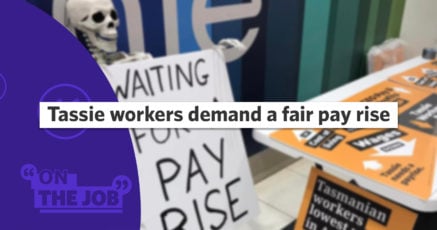As the Textile, Footwear and Clothing National Secretary of the CFMEU Manufacturing Division, Jenny Kruschel knows a dud deal when she sees it.
When carpet maker, Tuftmasters, started playing games during their recent bargaining dialogue with workers in the union, Kruschel was having none of it.
“Back into 2019, the union wanted to bargain with Tuftmasters to replace an enterprise agreement. The company told us, then and there, that they didn’t want to bargain. They wanted to terminate the agreement, go back to the Award,” Kruschel said.
Enterprise bargaining agreements (EBAs) are one of the best ways for workers to achieve pay increases and better working conditions.
The strongest agreements are those that are created through union members coming together and using their collective power to bargain with their employer.
“They did start bargaining, but in November last year, the company put in an application to the Fair Work Commission (FWC) to terminate the agreements,” Kruschel told On the Job.
The bad faith negotiation tactic from Tuftmasters was an attempt to erode wages and conditions that union members had bargained for over decades, such as a redundancy agreement that provided three weeks pay per year of service.
Also under threat of removal were casual conversion clauses that saw long term causal workers converted to permanent employees after a certain period of time as well as other important and hard-won gains for workers.
It was a cynical move and a typical example of how our current bargaining system has failed to keep up with modern day workplaces and workers’ needs.
Last Friday, the FWC threw out Tuftmasters application to terminate the agreement mid-negotiation, saying that to do so would reduce job security and damage the bargaining process.
After a lengthy and sustained campaign by workers in the CFMEU at Tuftmasters, the FWC decision was very much welcomed.
Jenny Kruschel said the decision was a big win for the workers, and it showed that standing up to bad faith bargaining works.
“It’s a really important decision because it leaves workers with the terms and conditions that they currently have,” she said.
‘It’s been a long process, stretching over two years. When we started bargaining, the company told us they wanted terminate the agreement and take us back to the Award.”
“If they’d been allowed to do that, we would have lost a lot, including the right to arbitration if there was a dispute in the workplace. We would have lost a whole lot of union rights for workers to have additional representational rights in consultation.”
“The agreement had an unpaid leave provision, because a lot of the workers come from overseas and their families are still overseas. It had a really good redundancy package. And had some additional benefits and allowances as well,” Kruschel said.
Tuftmasters were crying poor, claiming they could no longer meet the existing provisions of the agreement, and that the company might shut its door within months if it wasn’t allowed to bust workers back down to award conditions.
In its ruling, the FWC found this stance dubious to say the least.
Deputy President Val Gostencnik stated the claims were “highly questionable” and dismissed the company’s claims about facing a cash flow crisis.
The CFMEU sought details of production orders to ascertain the company’s financial state. They showed Tuftmaster recorded an operating loss in 2019 and 2020, but it recorded an operating profit in 2017, 2018 and 2021, and was forecasting a $1 million profit off a margin of 22 per cent this year.
If Tuftmasters wanted to cry poor, now certainly wasn’t the time to be doing it.
Gostencnik said Tuftmasters’s financial performance over the last two years was “vastly improved and was [and is] profitable compared to 2019 and 2020”.
Jenny Kruschel said the employees are delighted with the ruling.
“They are really happy because they obviously want to keep their current terms and conditions, but we’ve still got to negotiate an EBA.”
Kruschel now wants to see the law changed so that companies can no longer game the bargaining process to make it unworkable as a way of terminating agreements and reverting to weaker Award conditions.
“That sort of behaviour changes the dynamics and the power balance in bargaining. It allows an employer to go through a pretend bargaining process and then get to the end and say – we can’t reach an agreement, and the EBA needs to be cancelled,” she said.
“It gives the employer much greater power than the workers. It’s an easy out, a way of stripping away decades of terms and conditions.”
The biggest lesson in all this, according to Kruschel, is simple.
“Join your union, but not only join, be active in your union and stand up and make a difference.”













SHARE:
Tuftmasters carpeted by union win